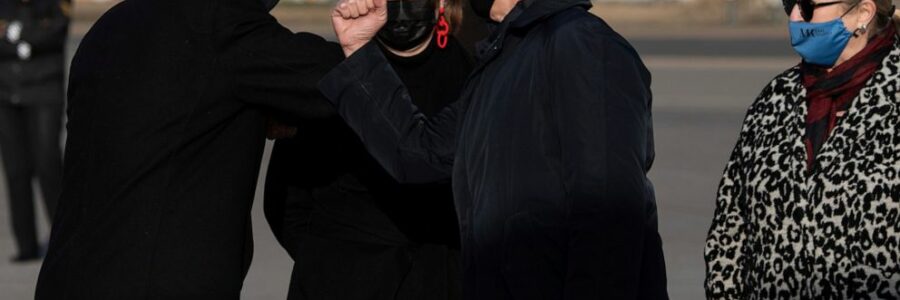
Blinken touts Biden climate policies as shift from Trump
REYKJAVIK, Iceland — On a trip overshadowed by the crisis in the Middle East, U.S. Secretary of State Antony Blinken on Tuesday touted the Biden administration’s abrupt shift in its predecessor’s climate policies as he visited Iceland for talks with senior officials from the world’s Arctic nations.
In Reykjavik for a meeting of foreign ministers of the eight members of the Arctic Council, Blinken heralded President Joe Biden’s return to the Paris climate accord and determination to combat climate change.
Yet the worsening violence between Israel and the Palestinians hung over the discussions. Blinken made at least three phone calls on the matter from his Reykjavik hotel and discussed the issue with Icelandic officials as a small group of pro-Palestinian demonstrators holding banners and flags protested outside the meeting venue.
As he did on his first stop in Denmark, Blinken basked in praise from his hosts about the Biden administration’s rejection of former President Donald Trump’s “America First” policies that included withdrawing from the Paris climate accord, the U.N. Human Rights Council and the Iran nuclear deal, questioning the value of NATO and minimizing dangers posed by climate change.
“There is no doubt, the policy change is very clear and we welcome that because the United States is the leader of the free world,” said Icelandic Foreign Minister Gudlaugur Thor Thordarson. He said Iceland was particularly grateful for the new approach as it relies heavily on the U.S. and other NATO allies for security and defense.
“We are very focused on reinvigorating our closest alliances and partnerships, and also our engagement in multilateral institutions, and being here really represents both aspects of that effort,” Blinken said. He lauded Iceland for its strong support for human rights, climate change mitigation and the role it plays in NATO.
The Arctic is warming faster than the rest of the world and has been particularly hard hit by rising sea levels from melting sea ice and glaciers. Trump had alienated Arctic countries and others with his dismissal of the phenomenon and his withdrawal from the 2015 Paris agreement.
Trump’s former Secretary of State, Mike Pompeo, also stunned many in the environmental community at an Arctic Council meeting two years ago in Finland with a call for countries to embrace and harness climate change, particularly the opening of new sea lanes due to melting ice, for commercial gain.
Blinken will tour several Icelandic geo-thermal energy sites later Tuesday before holding a series of bilateral meetings with other Arctic Council foreign ministers on Wednesday. Among them will be Russian Foreign Minister Sergey Lavrov in what will be the highest-level face-to-face talks between the two countries since Biden took office.
Blinken will see Lavrov amid a sharp deterioration in ties between Washington and Moscow sparked by Russia’s buildup of troops along the border with Ukraine, cyberattacks, Moscow’s actions against dissident Alexey Navalny, and allegations that Russia interfered in U.S. presidential elections in 2016 and 2020. The two nations are also at odds over influence in the Arctic, with Russia insisting its large Arctic landmass makes it the pre-eminent power in the region.
Blinken said his meeting with Lavrov would be an important opportunity to test the proposition that the U.S. and Russia can work collaboratively on certain issues, like climate change, the Mideast, Iran and North Korea, despite bitter disagreements on others.
“It would be our preference to have a more stable and more predictable relationship with Russia,” he said. “At the same time, we’ve been very clear that if Russia chooses to take reckless or aggressive actions that target our interests or those of our allies and partners, we’ll respond. Not for purposes of seeking conflict or escalating but because such challenges cannot be allowed to go forward with impunity.”
One area of disagreement is the Arctic, where Blinken rejected Russian calls to resume a military component of the Arctic Council and expressed concerns about Russia’s increasing military activity in the region known as the “high North.”
“We have concerns about some of the recent military activities in the Arctic,” he said. “That Increases the dangers of accidents and miscalculations and undermines the shared goal of a peaceful and sustainable future for the region. So we have to be vigilant about that.”
Blinken also took Lavrov to task for comments earlier this week in which he dismissed such criticism because the Arctic “is our territory, our land.”
“We have to proceed all of us, including Russia, based on the rules, based on norms, based on the commitments that we’ve each made and also avoid statements that undercut those,” Blinken said.
Moscow and Washington are also embroiled in a bitter dispute over the status of their respective embassies and consulates after tit-for-tat expulsions this year. Russia has given the U.S. until Aug. 1 to get rid of all non-American staff at its diplomatic missions, something the U.S. says will make it nearly impossible for its facilities to function.
Blinken and Lavrov’s talks will also serve as a preview for an expected summit between Biden and Russian President Vladimir Putin next month.
———
Follow all AP stories on climate change issues at https://apnews.com/hub/climate.
Source: Read Full Article